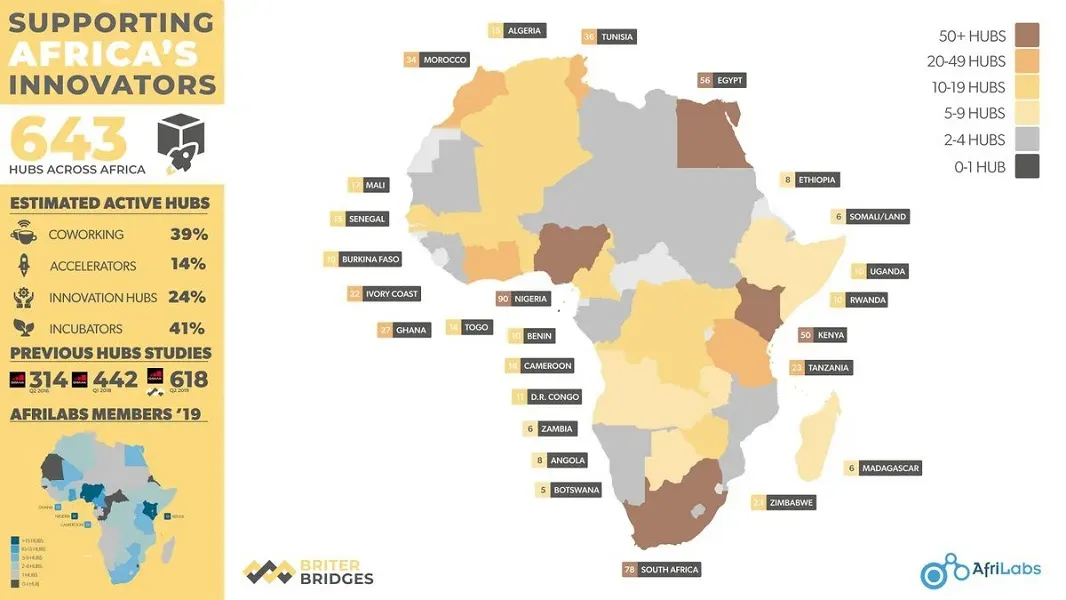What is a Tech Hub?
A tech hub is basically a physical space, whether a city or suite of offices, that fosters innovation for technology startup companies. Briter Bridges defines tech hubs as “physical spaces designed to foster and support tech start-ups.” These include innovation centers such as incubators, accelerators, marketplaces, fab labs, and co-working spaces, and hackerspaces.
According to Dario Giuliani, the founder of Briter Bridges, tech hubs across African cities play a catalyst role that surpasses supporting startups. While some offer only co-working facilities, Dario says that most hubs are safe havens for young people looking for training centers that promote digital literacy.
Africa Tech Ecosystems
Over the past few years, technology ecosystems in Africa have experienced tremendous growth. Increased corporate involvement and venture funds are some of the factors that are driving growth. The ever-growing, innovative communities in the continent have also been driving the current growth of African tech hubs.
Furthermore, most technology hubs in Africa are offering communities with the infrastructure to support and promote home-grown innovations. These hubs provide training, access to fast internet, and technical supports to startups. Also, they are offering social and professional networking through which tech entrepreneurs can thrive.
African Tech Hub Numbers

Which Country has the most Tech Hubs in Africa?
Nigeria has the highest number of tech hubs (85) followed by South Africa, which boasts of 80 hubs. These two nations are the most advanced technology ecosystems in Africa. Their hubs offer investment networks and well-established collaborations. Lagos, which is the top African tech hub, has more than 40 tech hubs. Kenya comes third with nearly 50 tech hubs that make it the heart of the tech ecosystem in East Africa.
New corporates and investors continue to flock to Nairobi to seize the growing tech opportunities in the country. However, Egypt is quickly emerging as a technology focal point in northeastern Africa. Besides Egypt, Tunisia and Morocco are fueling entrepreneurship in North Africa. Several francophone countries in West Africa like Senegal and Côte d’Ivoire are registering sprouts of tech ecosystems.
Top 10 African Tech Hubs
- Wennovation Hub (Nigeria)
- Silicon Cape Initiative (South Africa)
- K-lab (Rwanda-Kigali)
- Co-Creation Hub (Nigeria)
- SmartXchange (South Africa)
- iHub (Kenya)
- Flat6Labs (Egypt)
- Nailab (Kenya)
- MEST (Ghana)
- Iceaddis (Ethiopia)
Conclusion
As tech hubs in Africa evolve, different players need to identify and understand ways to enhance the effectiveness of these hubs and extend their longevity. Investors should conduct thorough feasibility assessments before launching tech hubs to determine their core purpose. The needs of key stakeholders including entrepreneurs and investors should be considered to guarantee the success of every African tech hub.
Also, common challenges such as financial sustainability could be easily handled when tech hubs share ideas, failures, and best practices. Hopefully, the rising tech hubs in Africa will be able to bridge Africa’s technological gap in no distant time. Have you been part of any tech hub in the past? Share your experience with us in the comments section below.
Our Offices
Brossard, QC J4X 1C2
KG 16 Ave, Kigali, Rwanda
Emails
Projects: project.team@kraxen.ca
Human resource: hr@kraxen.ca
Dev team: dev@kraxen.ca
